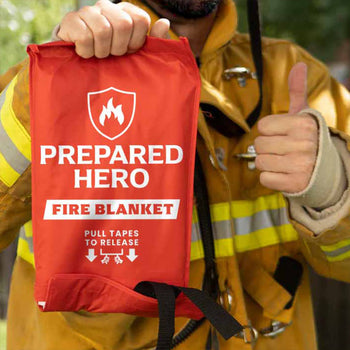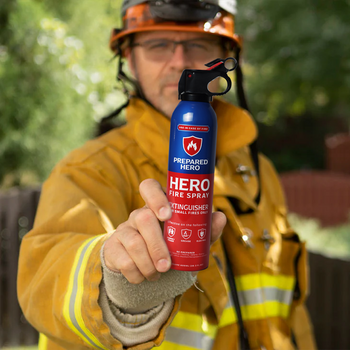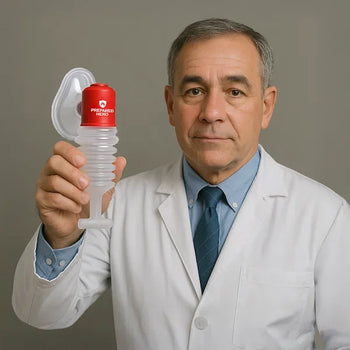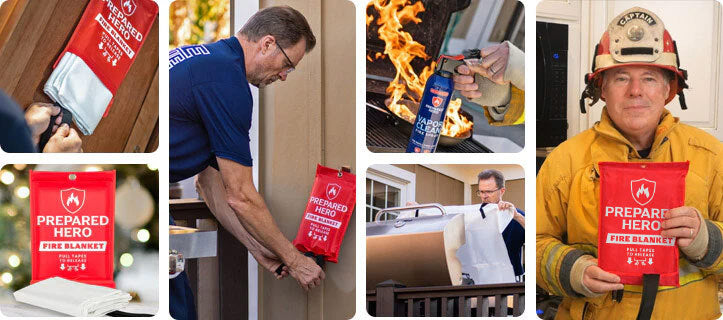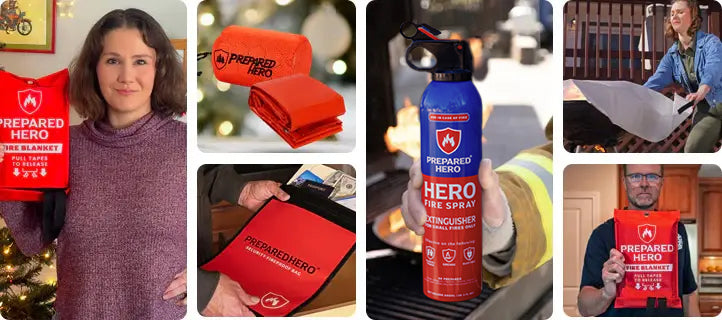Where you put your smoke detectors matters just as much as installing them. Proper placement makes sure they can detect...
Personal safety is something you should think about―whether you're walking, hiking, camping, driving, or traveling. It’s not about expecting something bad to happen but being ready for whatever happens. From simple actions like locking your doors to carrying pepper spray, these small steps can make a huge difference. We’ll also cover practical safety tools and rules you can follow to feel more secure wherever you go.
What Is Personal Safety?

Personal safety is about protecting yourself in your everyday life. It’s about being aware of your surroundings and avoiding risky situations. This means carrying pepper spray, locking your doors at night, or trusting your gut when something feels off.
For example, staying in well-lit areas and avoiding empty streets keep you safe when walking alone at night. Another example is keeping your valuables close to avoid pickpockets in a crowded place.
Personal safety also means knowing when to ask for help. If you feel unsafe, don’t hesitate to call a friend or the authorities. It’s important to have a plan in case something goes wrong.
Taking steps for personal safety doesn’t mean you expect something bad to happen, but it’s about being prepared just in case. It’s as simple as locking your car doors, not texting while walking in public, or letting someone know where you’re going if you’re heading out alone. Small actions can make a huge difference when it comes to staying safe.
Personal Safety Rules Everyone Should Follow

Staying safe is important, no matter where you are. We’ve categorized the best personal safety tips to make them easy to follow. Whether you’re walking around the block, driving, or traveling, these tips will help you stay safe.
In General
- Stay alert and aware of your surroundings at all times.
- Trust your instincts. If something feels off, leave immediately.
- Avoid distractions like headphones or excessive phone use, especially in unfamiliar areas.
- Walk with confidence and purpose, and make eye contact with those around you.
- Know your neighborhood and stick to busy, well-lit areas.
- Always carry a personal defense alarm, pepper spray, or both.
Street Safety
- Avoid walking alone at night. Bring a friend or stay in populated areas.
- Stick to main roads and avoid shortcuts through alleys or vacant lots.
- Keep your purse close to your body.
- Walk near the curb and avoid doorways, bushes, and other hiding spots.
- If someone tries to engage you in unwanted conversation, politely decline and keep moving.
Car Safety
- Always lock your car doors, even when you’re inside the vehicle.
- Park in well-lit spots and avoid isolated areas.
- Check the back seat and under the car before entering.
- Drive to a public area or police station if you’re being followed.
- Stay in your locked car and call for help if it breaks down in the middle of nowhere.
Public Transportation Safety
- Stay near other passengers, especially during off-peak hours.
- Avoid isolated bus stops.
- Keep personal belongings close to your body. Be aware of pickpockets in crowded areas.
- Don’t engage with people who make you uncomfortable.
-
Report any issues to the driver.
Office Safety
- Lock your door if you’re working alone or after hours.
- Avoid leaving personal items like wallets or phones in plain sight.
- Ask a colleague or security to walk you out if you’re leaving late.
- Be familiar with emergency exits and procedures.
- Report suspicious activity to security or management immediately.
Home Safety
- Always lock your doors, even if you’re stepping out for a moment.
- Never let strangers in, especially when you’re alone.
- Keep valuables like jewelry and electronics out of sight.
- Report suspicious activity to authorities immediately.
-
Avoid sharing your location or daily routines with strangers.
Social Media Safety
- Avoid sharing personal details like your address or travel plans.
- Regularly check your privacy settings to control who can view your content.
- Think before posting photos or information that could compromise your security.
-
Avoid accepting friend requests from people you don’t know.
ATM Safety
- Use ATMs during the day. The busier the area, the better.
- Keep your access code private and memorize it. Never write it down.
- Cover the keypad when entering your PIN.
- Don’t count or display cash in public. Put it in your purse immediately.
- Avoid accepting help from strangers. Call your bank for help if needed.
Travel Safety
- Use the main entrance when returning to your hotel at night.
- Scan your hotel room using a hidden camera detector (aka a privacy pen).
- Always lock your room.
- Avoid inviting strangers into your room.
- Store valuables in the hotel safe.
-
Report any suspicious activity to hotel management.
Parking Lot Safety
- Park in highly visible, well-lit areas.
- Keep car doors locked at all times, and never leave your keys inside.
- Avoid staying in the parking lot. Walk directly to your car.
- Honk your horn if a suspicious person approaches you.
Campus Safety
- Use campus escort services or shuttles when walking alone at night.
- Walk on well-lit paths.
- Be familiar with campus security hotlines.
- Report suspicious behavior to campus security immediately.
What Are the 3 A’s of Personal Safety?

The 3 A’s of personal safety are awareness, assessment, and action. They provide an easy and effective approach to self-defense. Here's a breakdown of each step:
Awareness
Being aware means knowing who and what is around you. It’s the first step to avoiding danger.
- Stay Observant: Look around and scan your surroundings regularly.
- Know Your Exits: Keep track of doors, windows, and potential escape routes.
- Avoid Distractions: Don’t let your phone, headphones, or other tasks keep you from staying alert.
- Trust Your Intuition: If something feels off, don’t ignore it. Your gut is often right.
Assessment
Assess the situation next. This means evaluating the people and environment around you.
- Survey the Area: Are you indoors or outdoors? Is the lighting enough? Are there other people nearby who can help you?
- Identify Potential Risks: Look for signs of trouble like intoxicated individuals, suspicious behavior, or concealed weapons.
- Know Your Escape Options: Where can you run to if needed? What objects could shield or protect you? Do you have a pepper spray or personal defense alarm?
- Observe Others: Take note of others’ demeanor. Are they calm, angry, or acting erratically?
- Evaluate Yourself: Know your strengths, such as running fast or staying calm under pressure, and use them to your advantage.
Action
Lastly, take action if necessary.
- Act Quickly: Don’t hesitate or wait if danger is imminent. Use your personal safety tools and move to safety immediately.
- Call for Help: Use your phone, whistle, or alarm to attract attention.
- Escape Over Engagement: Avoid confrontation whenever possible. Prioritize getting out of the situation.
- Stay Confident: Show confidence in your movements and decisions to discourage potential threats.
Top Personal Safety Tools
Personal safety tools are things you should always have on hand. Whether it's for traveling or walking home alone, these personal safety tools ease your worries:
1. Pepper Spray

Pepper spray is a must-have personal safety tool. It’s lightweight, easy to use, and can stop an attacker fast. It can usually spray within a 10-foot range, keeping you at a safe distance from your attacker.
Plus, it’s trusted by professionals like the military and police because it works immediately. It can protect you whether you’re walking your dog, traveling, or heading out at night.
Carrying pepper spray can also scare off potential attackers before anything happens. Even if they don’t back down, you have the power to defend yourself quickly and effectively. It’s small, discreet, and gives you peace of mind wherever you go.
Unfortunately, not all pepper sprays are made equal. Here's a table showing the differences between the Prepared Hero Pepper Spray Keychain and regular ones:
| Prepared Hero’s Pepper Spray | Regular Pepper Spray |
| Sprays where you aim | Inconsistent; sprays all over the place |
| Can work up to 12 feet | Limited within 10 feet |
| Can be used effectively in windy or rainy conditions | A little wind can blow the spray off target and into your face |
| Reliable protection for five years | Short shelf life, usually one to two years |
| Starts working instantly on contact | Takes more time to work |
| Has UV dye for identifying the attacker | No UV dye |
How Long Does Pepper Spray Last?
Pepper spray usually lasts about two years before it starts losing its effectiveness. However, some brands, like the Prepared Hero Pepper Spray Keychain and Prepared Hero Pepper Spray Max, can last five years.
Over time, the active ingredient, oleoresin capsicum (OC), weakens. The pressure in the can also drops. This means it might not spray as far or with as much force. Temperature changes can also speed up this process, especially if the spray is exposed to extreme heat or cold.
Check the expiration date printed on the can to make sure your pepper spray is still good to go. If it’s expired or the spray feels weak when you test it, replace it as soon as possible. Remember, the spray can lose its potency even if you haven't used it.
Proper storage is key, too. Keep it in a cool, dry place and away from any extreme temperatures to help extend its shelf life.
Bear Spray vs. Pepper Spray
Bear spray and pepper spray are both designed for self-defense, but they serve different purposes. Bear spray is specifically against large animals like bears. It contains a higher concentration of capsaicin (1 to 2%), which causes intense irritation in the animal’s eyes, nose, and throat, making it back off. Bear spray also has a longer range of up to 30 feet, which is helpful when dealing with a large, fast-moving animal. It comes in larger canisters (200 to 300 ml), so you have enough spray to fight large animals.
On the other hand, pepper spray is made for human attackers. It has a lower concentration of capsaicin (0.18 to 1%) and works by causing intense pain, temporary blindness, and difficulty breathing. This gives you enough time to escape. Pepper spray is smaller and more portable. They’re usually in 30 to 100 ml canisters. It’s ideal for close-range defense and is commonly used by people in urban settings.
In short, bear spray is stronger, bigger, and is meant for wild animals. Meanwhile, pepper spray is smaller, has a shorter range, and is best for human attackers. Each spray is designed for specific situations, so you should choose based on where you are and who you're trying to protect yourself from.
Mace vs. Pepper Spray
Mace and pepper spray are popular self-defense tools, but they differ in a few ways.
For one, the original mace formula contained a chemical called phenacyl chloride (tear gas) that caused eye and throat irritation. It was used mainly for crowd control and wasn’t very effective on people under the influence or those with high pain tolerance. This version of mace has been phased out because it was toxic and unreliable.
On the other hand, pepper spray uses capsaicin, the active ingredient in chili peppers. It causes a strong burning sensation and temporary blindness. Pepper spray is also effective on everyone, including those who are intoxicated or on drugs. It works quickly, and the effects can last up to an hour.
The mace we know today refers to any kind of self-defense spray. But it's actually a brand name trademarked for specific products. Over time, the term has been associated with pepper spray and other self-defense sprays, even though the original formula was different from what we use today. It’s also legal in most places, whereas traditional mace is no longer allowed because of its harmful side effects.
2. Personal Defense Alarm

Carrying a personal alarm gives you peace of mind, especially when walking alone at night, commuting, or exploring unfamiliar areas. It’s an affordable investment that can make a big difference in dangerous situations.
A personal defense alarm is small, portable, and easy to use. For instance, the Hero Defense Alarm produces a 130-decibel siren and flashes a bright strobe light. These features work together to scare off attackers and alert others nearby. This quick response helps you escape danger and call for help.
Unlike other safety tools, a personal defense alarm is suitable for people of all ages, including children and seniors. Simply pull the plug, and it activates. Modern alarms are also discreet and can be clipped on bags and belt loops for easy access. Whether you’re getting it for yourself or as a gift for someone else, a personal defense alarm is a powerful tool.
Here's a table showing the differences between the Hero Defense Alarm and regular personal defense alarms:
| Hero Defense Alarm | Other Alarms |
| 130 screeching decibels | Not as loud as alarming |
| Blinding bright light | No light settings |
| Same-side siren and light design | Light on the back blinds yourself |
| USB-C fast charging | Requires watch batteries |
| Lasts for 40 continuous minutes | Not rechargeable |
| Lasts for months without use | Dies fast |
How Personal Defense Alarms Keep Night Workers Safe
Personal defense alarms are great tools for night workers who often feel uneasy working alone or walking in the dark. These small, portable devices produce a loud noise when activated. The piercing sound alerts others nearby, which is crucial in busy environments. They also feature bright, flashing lights that scare off attackers.
In addition, personal defense alarms are lightweight and easy to attach to your clothing or bag. They also offer peace of mind for night workers. Lastly, knowing you can scare attackers and call for help with a simple pull lets you focus on work.
How Personal Defense Alarms Keep the Elderly Safe
Personal defense alarms also keep the elderly safe, especially those with difficulty moving. They let seniors get help quickly in emergencies, such as a fall or sudden illness. With just a push of a button, they can immediately alert family, caregivers, or emergency services without shouting or struggling to reach a phone.
These alarms also give peace of mind to family members, knowing their loved one can call for help when needed. Personal defense alarms also help elderly people who live alone maintain their independence. Plus, the alarms protect you against intruders. If someone tries to break in, the alarm will make a loud noise to scare them away and alert others nearby.
How Personal Defense Alarms Keep Children Safe
Personal defense alarms help keep your kids safe, especially when you're not around. These alarms are small, so kids can carry them in their backpacks or pockets. Plus, they’re loud enough to get attention when needed. If there’s an emergency at school, like a lockdown, your child can use the alarm to alert teachers or security. The sound can draw attention and stop bullying from getting worse.
Personal alarms are also useful when kids are out, whether they’re at the park, riding bikes, or walking home from school. If someone approaches them or they get lost, they can use it to call for help. They make kids feel more confident and in control of their safety.
How Personal Defense Alarms Help Keep Runners Safe
Personal defense alarms also help keep runners safe, especially when running alone or on quiet trails. If you are in a dangerous situation, simply pull the safety pin to activate the alarm. The loud sound can scare off attackers, giving you enough time to escape and call for help. Some alarms also have flashing lights that increase your visibility.
These alarms are also easy to use, even with sweaty hands or while running. Having one boosts your confidence, gives you peace of mind, and lets you enjoy your hobby.
How Personal Defense Alarms Keep Students Safe
Personal defense alarms help students stay safe, especially when walking alone in unfamiliar places. These alarms are small and easy to carry. They also make a loud noise that can scare off attackers and attract attention.
They’re also helpful during late-night study sessions when you’re walking to and from campus. With its easy-to-use design and reliable functionality, it helps students feel more secure no matter where they are.
How Personal Defense Alarms Help Keep Hikers and Campers Safe
Personal defense alarms are must-haves for hikers and campers. They help by drawing attention during accidents or when they get lost. The loud sound can alert nearby hikers or campers. These alarms also help scare off wild animals. If an animal gets too close, the noise can startle it and give you a chance to move away. The alarm can also scare off a dangerous person.
They're lightweight and easy to carry, making them perfect for outdoor activities. Plus, they're non-violent, so you don’t need to worry about legal concerns or using dangerous tools.
3. Privacy Pen

A privacy pen is a must-have personal safety tool in today’s digital age. This small, lightweight device helps you detect hidden cameras, bugs, and tracking devices. Whether you're staying in a hotel or bed & breakfast, using a public restroom, or doing investigative journalism, it protects you from prying eyes and ears.
Plus, it’s incredibly easy to use. Just hold it out and walk around the room. The device identifies hidden cameras by reflecting their lenses or detecting wireless signals from remote devices. Some models, like the Hero Privacy Pen, also include features like GPS tracker detection and a burglar alarm. The pen is also discreet and portable, making it perfect for travelers, property owners, or anyone concerned about privacy.
Here's a table showing the differences between the Hero Privacy Pen and a physical search:
| Hero Privacy Pen | Looking for Devices Yourself |
| Detects most devices | Time-consuming |
| TSA travel friendly | Tedious |
| Discreet and lightweight | Eyes alone might miss devices |
| Simply aim and detect | Can’t detect devices accurately |
| Trusted by professionals | Inconsistent |
Why Every Traveler Needs the Hero Privacy Pen
Traveling is fun. But it can put your privacy and security at risk, especially with the rise of hidden cameras and tracking devices. The Hero Privacy Pen is a must-have for every traveler. It’s small, lightweight, and fits in your pocket or bag.
The Hero Privacy Pen helps detect hidden surveillance devices like cameras, GPS trackers, and bugs using signal detection. It also has infrared technology to spot cameras that don’t use wireless signals, especially in low light. Plus, it doubles as a burglar alarm that warns you if someone tries to break into your room. With this pen, you can travel without constantly worrying about prying eyes.
How a Privacy Pen Protects You From High-Tech Criminals
A privacy pen protects you against high-tech criminals. It detects hidden surveillance devices like cameras, GPS trackers, and bugs by picking up wireless signals. If the criminal uses a device without wireless signals, the pen has an infrared detector that can spot lens reflections.
What makes the Hero Privacy Pen special is its discreet design. It's small, lightweight, and easy to carry around in your pocket or bag without drawing attention. It also has silent and vibrating modes, so you can get alerts without anyone noticing.
It can also detect if someone is trying to break into your room by turning into a burglar alarm/ In particular, it can detect when someone is turning your door knob. Plus, it’s TSA-friendly, so you can travel with it.
Where to Find Hidden Cameras in Everyday Items
Hidden cameras can be hidden in everyday items, which makes them hard to find. Here are some common spots where you might find them:
- Stuffed Toys: Small cameras can blend into plush toys, using their eyes to hide the lens.
- Picture Frames: A tilted frame could hide a camera with a wide view of the room.
- Mirrors: Some mirrors might be two-way mirrors with hidden cameras behind them.
- Alarm Clocks: These can hide small cameras, especially if they’re facing your bed or other private areas.
- Books: Look for hollow books or books with small holes in the spine, which can house cameras.
- Artificial Plants: The leaves can hide tiny camera lenses, giving a clear view of the room.
- Tissue Boxes: The slots and decorative holes can hide small cameras.
Conclusion
Being prepared doesn’t take much, but it can make all the difference. Simple actions like being aware of your surroundings, locking your doors, or carrying a personal defense alarm can help keep you safe. Trust your instincts, and don’t be afraid to ask for help if you need it.
Do you want reliable, easy-to-use, and affordable personal safety tools that scare off attackers? Check out Prepared Hero’s personal safety tools here, and get up to 51% off on certain items. Stay prepared, hero!


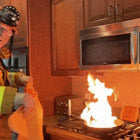 Fire
Fire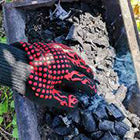 Safety
Safety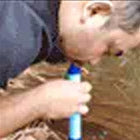 Survival
Survival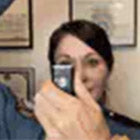 Protection
Protection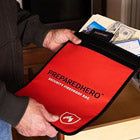 New
New
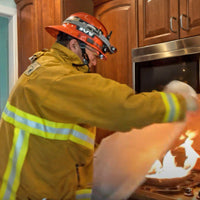 Fire
Fire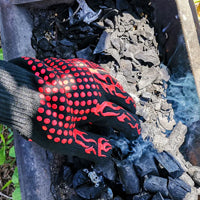 Safety
Safety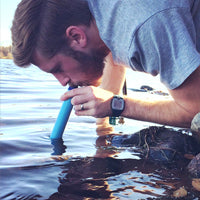 Survival
Survival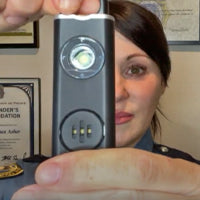 Protection
Protection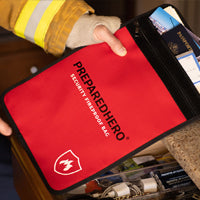 New
New
